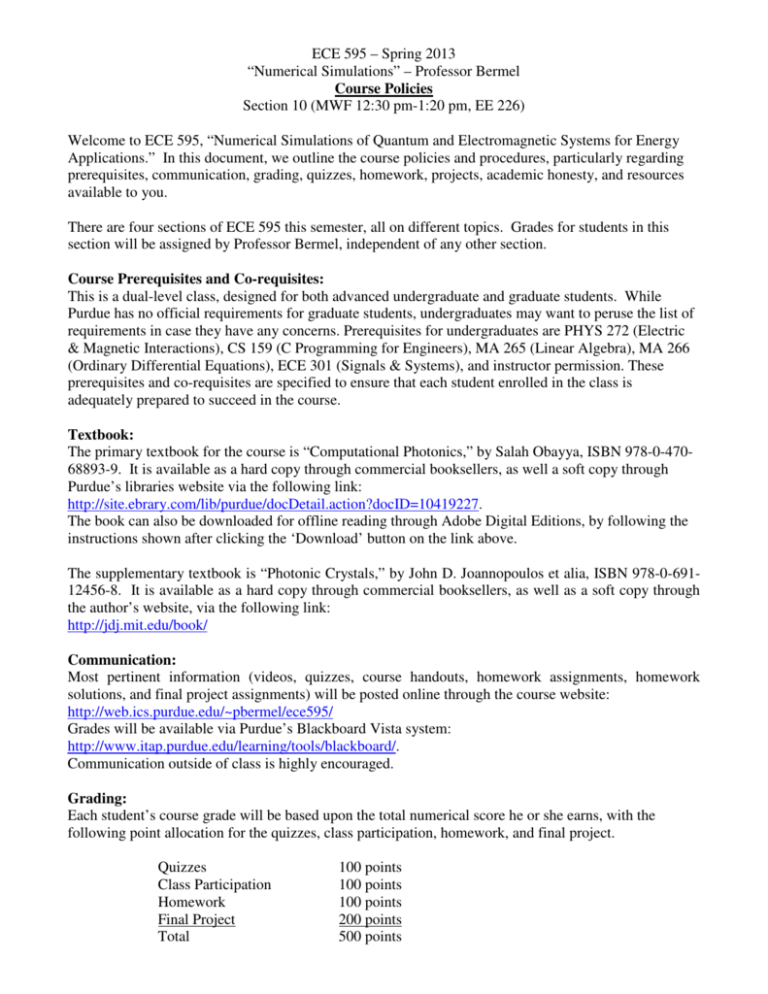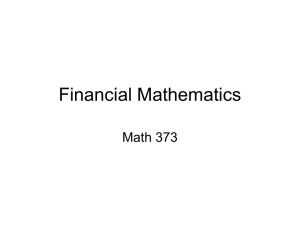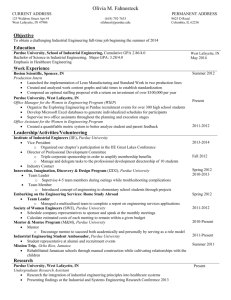Document
advertisement

ECE 595 – Spring 2013 “Numerical Simulations” – Professor Bermel Course Policies Section 10 (MWF 12:30 pm-1:20 pm, EE 226) Welcome to ECE 595, “Numerical Simulations of Quantum and Electromagnetic Systems for Energy Applications.” In this document, we outline the course policies and procedures, particularly regarding prerequisites, communication, grading, quizzes, homework, projects, academic honesty, and resources available to you. There are four sections of ECE 595 this semester, all on different topics. Grades for students in this section will be assigned by Professor Bermel, independent of any other section. Course Prerequisites and Co-requisites: This is a dual-level class, designed for both advanced undergraduate and graduate students. While Purdue has no official requirements for graduate students, undergraduates may want to peruse the list of requirements in case they have any concerns. Prerequisites for undergraduates are PHYS 272 (Electric & Magnetic Interactions), CS 159 (C Programming for Engineers), MA 265 (Linear Algebra), MA 266 (Ordinary Differential Equations), ECE 301 (Signals & Systems), and instructor permission. These prerequisites and co-requisites are specified to ensure that each student enrolled in the class is adequately prepared to succeed in the course. Textbook: The primary textbook for the course is “Computational Photonics,” by Salah Obayya, ISBN 978-0-47068893-9. It is available as a hard copy through commercial booksellers, as well a soft copy through Purdue’s libraries website via the following link: http://site.ebrary.com/lib/purdue/docDetail.action?docID=10419227. The book can also be downloaded for offline reading through Adobe Digital Editions, by following the instructions shown after clicking the ‘Download’ button on the link above. The supplementary textbook is “Photonic Crystals,” by John D. Joannopoulos et alia, ISBN 978-0-69112456-8. It is available as a hard copy through commercial booksellers, as well as a soft copy through the author’s website, via the following link: http://jdj.mit.edu/book/ Communication: Most pertinent information (videos, quizzes, course handouts, homework assignments, homework solutions, and final project assignments) will be posted online through the course website: http://web.ics.purdue.edu/~pbermel/ece595/ Grades will be available via Purdue’s Blackboard Vista system: http://www.itap.purdue.edu/learning/tools/blackboard/. Communication outside of class is highly encouraged. Grading: Each student’s course grade will be based upon the total numerical score he or she earns, with the following point allocation for the quizzes, class participation, homework, and final project. Quizzes Class Participation Homework Final Project Total 100 points 100 points 100 points 200 points 500 points Your course letter grade will be partially determined from your performance based on the above quizzes, homework, and final project. Other factors such as class attendance and participation may be included in determining grades. The grading scheme outlined above takes into account four Course Outcomes, as defined in our ABET accreditation standards, for which each student must demonstrate a minimum level of competency. These course outcomes are outlined in the next section. Course Outcomes: A student who successfully fulfills the course requirements will demonstrate the following abilities: i. ii. iii. iv. Explain strengths and weaknesses of computational techniques for electronic and electromagnetic systems. Calculate computational complexity of a given algorithm. Perform conventional and Fast Fourier transforms, based on existing codes. Solve for eigenvalues and eigenvectors, for both standard and generalized eigenproblems. You will have multiple opportunities to satisfy these ABET outcomes. The primary means will be through the regular quizzes, homework, and final projects. The professors will write questions based on these Course Outcomes. You will satisfy each Course Outcome when your score for the corresponding assignments equals or exceeds a value we specify as representing a minimal competency. If you fail to meet this level of minimal competency on a specific Course Outcome, you will have a second chance, typically on later assignments that cover overlapping materials. Homework: Homework assignments will be due every other week starting Friday, January 18, except for two weeks in a row on March 1 and March 8, as indicated on the syllabus. The deadline and mode for submitting homework is as follows: Homework should be emailed to pbermel@ecn.purdue.edu on the listed due dates. Doing the homework is the only way to truly learn the subject matter. Students who do not work the homework themselves typically do not perform well in the course. You may work together as you solve your homework problems, as this can be an effective means of learning the material. If you do work in a group, please be sure that the solution you turn in is your own work. You will receive reduced or zero credit for homework submissions that appear to be copies of each other. For written assignments, please write your solutions legibly and in an organized manner so that the grader can follow your work easily and, where possible, place your final answer in a box. For electronic assignments, please include basic documentation explaining what each block of code should achieve. Solutions to the homework assignments are posted online shortly after they are due. Final Projects: The final project will be an opportunity for you to take a numerical technique discussed in class, and extend it in a novel direction. You’ll have a great deal of leeway to choose a project, and are welcome to choose a research problem of interest. If you’re not sure what to do, Peter Bermel can offer you several suggestions. Everyone should work individually on their own project, as opposed to having other students write the code for them. You’re welcome to ask other students for general guidance, and to ask Peter Bermel for 2 specific feedback on your work if problems should arise. The deliverables for your final project will consist of a working numerical code, including a list of dependent packages so a third-party could install and run it on their machine; an oral presentation with slides explaining the motivation, method, and results; and the corresponding data files. A request to regrade the final project must be filed with Prof. Bermel within one week after the project grades have been posted. Due to Purdue policies, no such requests can be honored after the deadline. Academic Honesty Policy: We expect every member of the Purdue community to practice honorable and ethical behavior both inside and outside the classroom. Any actions that might unfairly improve one’s score on quizzes, homework, or final project will be considered cheating, and will not be tolerated. Examples of cheating: 1. Submitting or presenting work that is not your own (particularly without citation). 2. Asking other students for quiz answers before submitting your own. 3. Altering a quiz or homework, and then requesting a regrade. Cheating on homework or projects can result in a zero score for the assignment, or a failing grade for the course, at the discretion of Prof. Bermel. If necessary, we will also refer such a case to the Office of the Dean of Students. Class Attendance: Your attendance in class is extremely important. If you must miss a class, you are responsible for any material, information, handouts, announcements, etc. that you missed. Since participation is a key part of your grade, repeated absences will detract from your overall grade. Late arrivals and early departures from class can be disruptive, so please keep these to a minimum. Students with documented disabilities: Purdue University is required to respond to the needs of the students with disabilities as outlined in both the Rehabilitation Act of 1973 and the Americans with Disabilities Act of 1990 through the provision of auxiliary aids and services that allow a student with a disability to fully access and participate in the programs, services, and activities at Purdue University. Students with disabilities must be registered with Adaptive Programs in the Office of the Dean of Students before classroom accommodations can be provided. If you are eligible for academic accommodations because you have a documented disability that will impact your work in this class, please schedule an appointment with Prof. Bermel as soon as possible to discuss your needs, either within the first three weeks of classes, or within one week of receiving your accommodation letter,. If you do not communicate your accommodation needs in a timely manner, testing accommodations cannot be guaranteed. Campus Emergency: In the event of a major campus emergency, course requirements, deadlines and grading percentages are subject to changes that may be necessitated by a revised semester calendar or other circumstances. In such an event, information will be provided through email. 3 ECE 595 – Spring 2013 Schedule Section 10, MWF 12:30 pm-1:20 pm, EE 226 DATE 1/7-M 1/9-W 1/11-F 1/14-M 1/16-W 1/18-F 1/21-M 1/23-W 1/25-F 1/28-M 1/30-W 2/1-F 2/4-M 2/6-W 2/8-F 2/11-M 2/13-W 2/15-F 2/18-M 2/20-W 2/22-F 2/25-M 2/27-W 3/1-F 3/4-M 3/6-W 3/8-F 3/11-M 3/13-W 3/15-F 3/18-M 3/20-W 3/22-F 3/25-M 3/27-W 3/29-F 4/1-M 4/3-W 4/5-F 4/8-M 4/10-W 4/12-F 4/15-M 4/17-W 4/19-F 4/22-M 4/24-W 4/26-F LECTURE NO. 1 2 3 4 5 6 7 8 9 10 11 12 13 14 15 16 17 18 19 20 21 22 23 24 25 26 27 28 29 30 31 32 33 34 35 36 37 38 TOPICS Introduction and Overview of Our Class Goals of Numerical Computing Computability Theory Computational Complexity: Definitions, Classes Time Complexity; Upper and Lower Bounds Practical Assessment of Code Performance NO CLASS – MARTIN LUTHER KING JR. DAY Formulating and Classifying Eigenproblems Eigenproblem Techniques: Power, Rayleigh-Ritz Eigenproblem Techniques: Householder, QR, LU Generalized Eigenproblems Discrete Fourier Transforms: Naïve, Cooley-Tukey Algorithms Fast Fourier Transform (FFT): Computational Complexity FFTW Design FFTW Usage Beam Propagation Method (BPM) Analysis Finite-Element BPM Analysis Finite-Element BPM Mode Solving Application of BPM: Waveguiding Related Applications: Heat Transfer Related Applications: Electronic Transport Bandstructure Problem Electronic Bandstructures: Solution Methods Electronic Bandstructures: Tight-Binding (NEMO) Photonic Bandstructures: Master Equation, Solution Photonic Bandstructures: Conjugate Gradient Methods (MPB) Conjugate Gradient Methods Cont’d NO CLASS – SPRING VACATION NO CLASS – SPRING VACATION NO CLASS – SPRING VACATION Transfer Matrix Methods (TMM): T-matrix, R-matrix TMM: S-matrix, H-matrix TMM Simulations Rigorous-Coupled Wave Analysis (RCWA) RCWA Simulations in 2D (CAMFR) RCWA Simulations in 3D (S4) Coupled-Mode Theory Simulation Finite-difference time domain (FDTD) FDTD: Yee Lattice, Problem Formulation FDTD: Numerical Stability FDTD: Uniaxial PML FDTD Simulations Using MEEP FINAL PROJECT PRESENTATIONS FINAL PROJECT PRESENTATIONS FINAL PROJECT PRESENTATIONS FINAL PROJECT PRESENTATIONS FINAL PROJECT PRESENTATIONS FINAL PROJECT PRESENTATIONS 4 Reading Assign. SECTIONS SO 1.1* SO 1.2 -----JJ 2§ JJ App. D JJ App. D JJ App. D JJ App. D JJ App. D --SO 2.2—2.6 SO 2.7, 2.8 SO 2.9 SO 3.1—3.5 --JJ 3 --JJ 3 JJ App. D JJ App. D ---JJ App. D -JJ 9 ---JJ 10 SO 5.1—5.3 SO 5.4 SO 5.5—5.6 SO 5.7—5.10 SO 5.11—5.14 ------*SO=S. Obayya § JJ=J.Joannopoulos HOMEWORK SET DUE -----1 -----2 -----3 -----4 --5 --------6 -----7 ------- ECE 595 – Spring 2013 Instructors and Staff Class Section 10 MWF 12:30 – 1:20 pm EE 226 Professor Secretary Peter Bermel, EE 331A, BRK2270 Tel: 49-67879 Email: pbermel@ecn.purdue.edu office hours: MWF 12:20-1:20 pm or by appointment 5 Wanda Dallinger, EE 326B Tel: 49-46389 Email:wanda@purdue.edu office hours: M-F 8 am – noon & 1 pm – 5 pm






